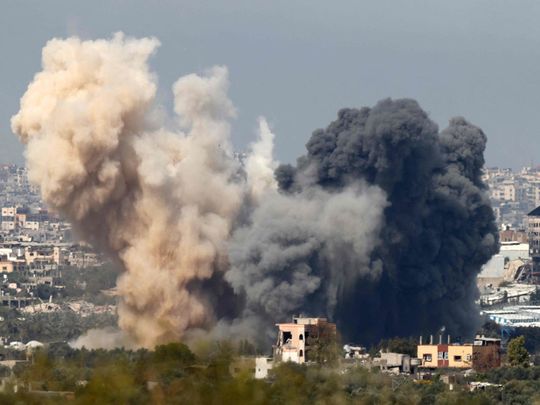
“Endured so long as it seemed beyond redress”, wrote mid-19th century political philosopher Alexis de Tocqueville, “a grievance comes to appear intolerable once the possibility of removing it crosses men’s minds”.
In language you and I prefer, that amounts to saying that once oppression reaches critical mass, there’s no way of putting the genie back in the bottle, for there’s fire in its blood.
Three quarters of a century of Palestinian grievance came into full relief for the whole world to see the day Palestinian militants launched their surprise Al-Aqsa Flood operation and Israel launched its genocidal war against Gaza not quite six months ago. This is a war that, in the dialectic of history if not on the ground, the Palestinians have already won hands down — and there’s an uncanny precedent to that dialectic from a former zone of conflict far from Palestine.
Around 3am on Jan. 31, 1968, a squad of Vietcong guerrilla fighters blasted a hole in the outer wall of the US Embassy in Saigon (now Ho Chi Minh City), the capital of South Vietnam, gunned down two American MPs who tried to stop them and laid siege to the fortified building.
A dialectical tension
The operation, known as the Tet Offensive, was part of a surprise, nationwide series of attacks against American forces and their allies in the country, attacks that ended as a military disaster for the insurgents, whose forces, after two months of fighting, were decimated by the superior firepower of the enemy.
But the then still new technology of communications satellites brought into the living rooms of ordinary Americans scenes of the carnage, particularly at the embassy, which severely damaged national confidence in the war and set in train developments that led to the American withdrawal from the country and the collapse of the South Vietnamese regime.
The anomaly is inescapable — a costly battlefield defeat that eventually yielded political victory to the Vietcong, which culminated in the liberation and reunification of their land, the sought-after goal of the insurgents.
Palestine is not Vietnam and Operation Al-Aqsa Flood is not the Tet Offensive, but the dialectical tension that defined the conflict between occupier and occupied in that Southeast Asian nation and Palestine is the same, for just as the Tet offensive was a watershed moment that disabused Americans of any illusions they had had about their ability to to dictate the political destiny of wretched “peasants in black pyjamas” — over their heads and against their pleas — the shock and awe of the Al-Aqsa Flood operation shattered any illusions by Israel and its supporters in the US that Palestinians are likely to acquiesce, through an occasional “mowing of the lawn” here and there, to having the boot of an occupier indefinitely placed on their necks.
Sure, the war Israel has launched against the Palestinian people of Gaza has caused the 2.4 million residents of the blockaded enclave immeasurable suffering, suffering virtually without parallel in modern times, but one of that war’s many unintended consequences was the prompt insinuation of the Palestine Question, front and centre, into the global public discourse about social justice, freedom, equality and human rights.
Global solidarity
Those around the world who had long instinctively empathised with Palestinians — especially in countries in the Global South and in countries in the Global North, such as Ireland, whose people had struggled, endured and suffered to gain their independence, and thus shared a kinship of vision with Palestinians — have had their empathies reinforced, while those who had been hesitant about or indifferent to where their empathy lay, have had their eyes opened to the fact that the Palestinian people have indeed been all along the injured party in the dispute.
“When I travel the world, leaders ask me why the Irish have so much empathy for the Palestinian people”, Irish Prime Minister Leo Varadkar said at a joint appearance at the White House with President Biden on St. Patrick’s Day (March 17). “The answer is simple: We see our own history in their eyes. A story of displacement and dispossession, a national identity questioned and denied, forced emigration, discrimination and now hunger”.
Bless your Irish heart, Leo. And lest we forget, the British Black and Tan thugs who were sent by London to terrorise the Irish people during the Irish War of Independence between 1919 and 1921 — thugs who gained a reputation for brutality, becoming, like Israeli settlers today, notorious for their attacks against civilians and their property, including murder and arson — were later sent to Palestine by the British Mandate Authorities to terrorise Palestinians in the late 1920s and later during the 1936-1939 uprising, known as the Great Revolt.
The only people who remain unmoved, not to mention out to lunch about the fact that this is a turning point in Palestinian history and that the world has turned with it are Israeli leaders, who still speak in the tongue of colonial overlords.
And here’s the most recent manifestation of that improbable posture.
Last week, Israel’s ambassador to the United Nations delivered a formal speech to the international body where he called for the imposition on the entire Palestinian population living under occupation a program of “deradicalisation”, likening them to Germans coming out of the Third Reich.
“The vast majority of Palestinians do not want peace”, he hollered. “This is why deradicalisation is key. The Palestinians must undergo an educational transformation, just like Germans after the Nazi regime was toppled. This is the only way to get the Palestinians to support coexistence with Israel”.
Hmm. Interesting. Dear readers, consider me, a Palestinian, de-Nazified and deradicalised already.
— Fawaz Turki is a noted academic, journalist and author based in Washington DC. He is the author of The Disinherited: Journal of a Palestinian Exile










